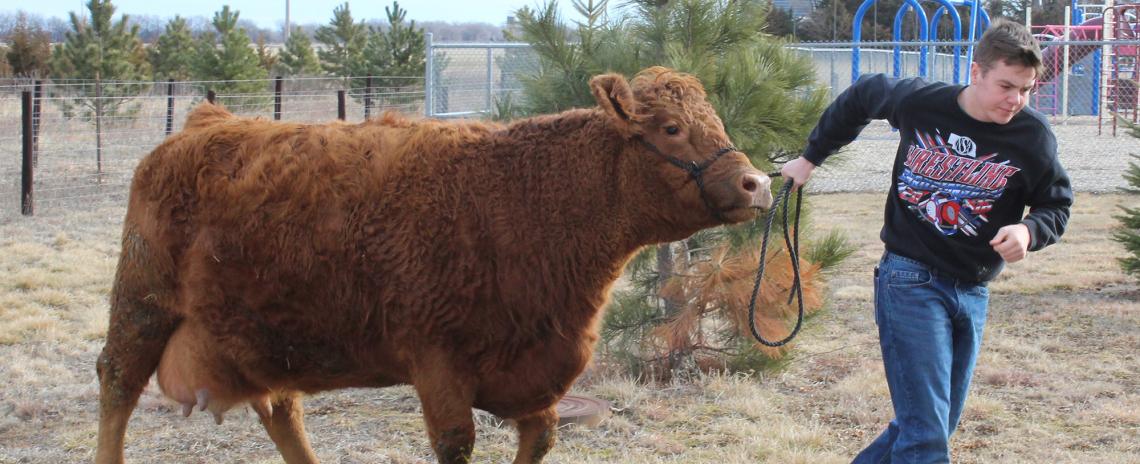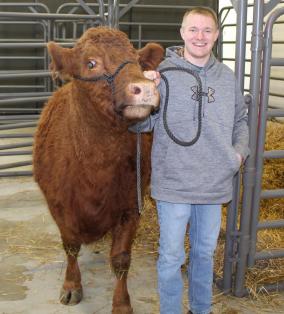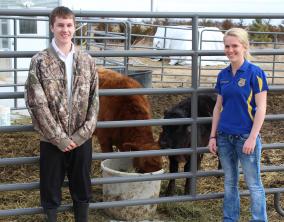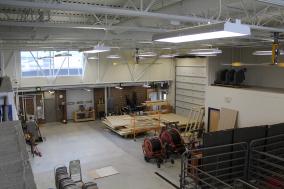The Coolest Cow in School: Cross County ag students await Rosie's calf
The Coolest Cow in School: Cross County ag students await Rosie's calf
By Tyler Dahlgren
NCSA Communications Specialist
Rosie is a star at Cross County High School.
She’s the subject of many hallway conversations, and the camera follows her every move.
Literally.
Her ‘round the clock video stream draws a healthy audience. She’s a sensation in the Cross County community, from Stromsburg to Benedict.
Rosie is the coolest cow in school.
***
A rural school 15 miles north of York, Cross County established its agriculture program in 2014. The ag facilities are state-of-the-art and uniquely accommodating, an element of intrigue during Amanda Hackenkamp’s job search three years ago.
“I knew when I was applying for jobs that Cross County had a new program in an agricultural community that gets a lot of support,” Hackenkamp, who spent her first year hatching chickens in a classroom while the final touches were being put on the new facility. “Having the ability to do what we need to with a large space providing all these opportunities is wonderful.”
Growing up on a farm, and from attending Southeast Community College, Hackenkamp learned largely from hands-on activities. She wanted to share those experiences with her students, and the new building offered endless instructional conveniences.
“We had the land, the building and the pasture, so we thought ‘Why not get animals that the kids can work with as well?’,” she said. “Agriculture in general is a very hands-on practice, so it doesn’t make sense for us to sit here in a classroom and say ‘Well, this is how you would raise a cow, or take care of an animal, or plant a plant.’”
Cross County’s school board has been supportive of the agriculture program implementation from the start. One member owns their own nursery business. Another runs their own agronomy business. There’s also a member that works in the livestock feed and nutrition business. In short, it wasn’t difficult to relay the importance of agriculture to the decision-makers.
“We have agriculture interspersed throughout the entire board,” Hackenkamp said. “They will take an idea and run with it, and even provide ideas of things they’d like to see.”
Now, the program houses two guinea pigs, two rabbits, a chicken, a goat, a one-year-old heifer named Red and a four-month-old calf that goes by Cesar.
And one extremely pregnant, seven-year-old cow named Rosie.
The talk of the town.
***
Reggie Rafert is a junior at Cross County, but he’s a seasoned veteran in the agriculture program, having been part of the original group that started the chapter.
He started farming crops on his family’s land sometime around the age of five, or as early as he can remember, and joined Future Farmers of America (FFA) as a freshman. And he’s partly responsible for Rosie’s fame.
The Rafert’s raise cattle as 4-H Show projects, and wanted to move Rosie from the pasture she was in early last summer.
“We realized we were getting livestock set up at school, and looking for cows, and we were trying to get Rosie out of the pasture anyways, so we thought we might as well bring her up here,” Rafert said, shortly after helping with an elementary school meet and greet in the facility.
For students like Rafert, who is considering studying agronomy in college, the addition has been a blessing. Before, ag students would share the woodshop with welding. Now, each practice has its own specialized and spacious area.
“We can bring cattle in, we don’t have to keep them outside,” Rafert said. “Having this building has been very nice and a huge luxury. We have it all wired up and it’s all air compressed.”
Fellow junior Madi Baker didn’t grow up on a farm, but has always loved animals. Being part of the ag program has shifted her prospective career path. What was once an afterthought has become her favorite period of the day.
“I am looking to maybe do something with architecture and construction, but now I also think I’d really like to have agriculture play a part in my future,” Baker said. “I think it provides a lot of lessons and we have a very unique opportunity.”
The program has grown to about 50-60 ultra-engaged students, a testament to the investment the school made in 2014. The kids at Cross County responded to an opportunity presented, and all parties have benefitted.
“It’s been a really big honor to be able to be a part of the program and take part in these activities,” Baker said. “I personally like hands-on learning, so this has been a cool experience. We get to put what we learn in textbooks and notes into a practical form and really see what we’re learning put to use.”
Lane Kelley is one of several Cross County students that will take the practical experience offered at school into the next stage of his life.
“I know it benefits me personally, planning to become a vet,” Kelley said. “I’ve had the opportunity to see a lot of the different situations first hand.”
Kelley regularly sees classmates profit from the program.
“A lot of kids go and work for farmers and ranchers, and they can use the skills they’re learning right here in class,” he said.
***
The eyes of the community are on Rosie continuously.
Students are patiently, or anxiously, awaiting the arrival of a new calf. High above her stable sits a laptop, which records Rosie day and night.
It’s called the “Rosie Cam”, and it’s helped the beloved cow gain quite a following in the online world. Comments and questions funnel in on a discussion panel below live footage of Rosie, who is expected to give birth any day now.
Hackenkamp had seen interest in eco-cam systems rise. She knew the school had a cow that would be calving soon, and put two and two together and shared the live-stream idea after Christmas break.
“We have had a lot of people extremely supportive of it, and they have loved the idea,” she said. “Now, sharing the whole story live with everyone else has been a big part of it too. It’s been a way to share agriculture, which is kind of the dream.”
Monitoring Rosie is a collective effort, one Hackenkamp turned into a learning tool. Her animal science students handle the chores every morning and every night. Even when it’s freezing cold.
“If it’s cold, I tell them to put on a jacket,” Hackenkamp says half-jokingly.
The students that come in the morning handle the main chores, while the afternoon groups take care of the livestock and small animals. The horticulture class maintains the greenhouse.
Nobody knows exactly when Rosie’s calf will finally come, but it’ll be sure to be a unique experience, one Hackenkamp has only personally witnessed one time before.
“It was an experience unlike any other,” she said. “I can remember crawling across a field with my mom to see it happen. Being able to share that experience with others is where the video stream idea came from.”
***
Though this trip had to do with Rosie, the cow at Cross County, there’s a school beyond the agriculture doors, past the very vocal goat, chicken coup and welding station.
Cross County School is a wildly impressive building that sits a hop, jump and skip east of the Big Blue River.
The basketball gymnasium is one of the finest in the state, and the weight and wrestling rooms are impressive in their own right. Framed photos of athletes that have moved on to college competition hang on a wall above the gym. Cross County is proud of all its students.
“I love smaller schools,” says superintendent Brent Hollinger. “Nothing against big schools. There’s some great ones out there. I think Nebraska is full of very good small schools.”
Hollinger grew up in a school where the teachers knew every student, and vice versa. He’s cultivated the same culture at Cross County, where a student body eager to learn is the top priority of the school board, teaching staff, and even community.
“We have had great support from our communities, and we got an agriculture teacher (Hackenkamp) with good knowledge and background with animals,” Hollinger said. “It’s been a good fit so far and the kids absolutely love it.”
The number of students participating in the agriculture program continues to increase. Hollinger feels the best recruiting tool available is a group of students willing to share their excitement in the hallways with the rest of the student body.
That’s what they have at Cross County.
“We are only in year two of this building,” he said. “Where we are at now, yes it’s what we had envisioned, but is it going to keep growing? You bet.”
Hollinger echoed the importance of hands-on learning, and said students will learn about marketing cattle for selling. Local cattle for slaughter will be put into the school’s lunch program, which will give the students a first-hand look at the “from farm to fork” method.
“That’s how I learned growing up,” Hollinger said. “When we did this addition, that was our goal. We weren’t just going to read about it, we were going to do it.”
Cross County isn’t the only public school in the state that thinks outside of the box for the betterment of its students.
“It’s a neat, neat situation in not only this public school, but in schools across the state where you see things like this going on,” Hollinger said, pointing to the pen.
There lies Rosie, the most famous (and most pregnant) cow around.





